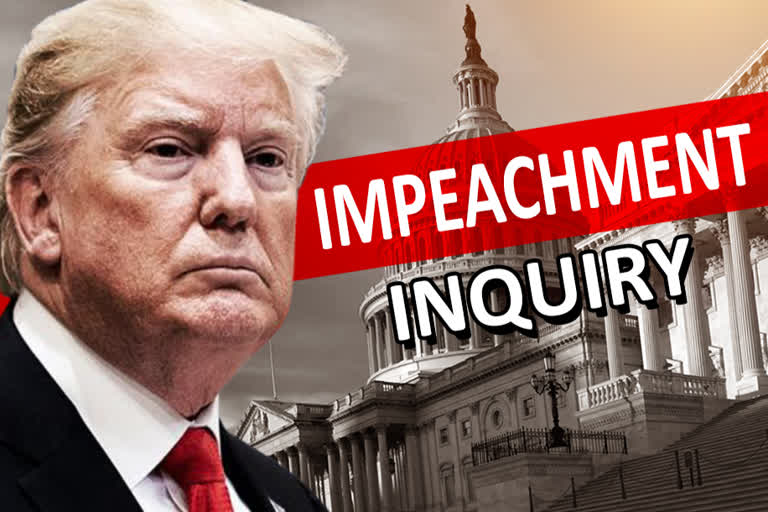Washington: After a month of closed-door testimonies, the Democrats have decided to take their case for impeaching President Donald Trump to the American people.
It’s a new front for the warring parties – the Democrats and the Republicans – as 2020 approaches and the battle for the minds of an already polarized electorate begins. Polls show that a slim majority supports impeachment but the hearings could shift the mood.
Televised hearings begin on Wednesday and will continue on Friday with three key witnesses testifying about how Trump abused the power of his office to pressure Ukraine’s President Volodymyr Zelensky to investigate Democratic presidential candidate Joe Biden and his son Hunter Biden.
Hunter Biden got on the board of a Ukrainian natural gas company while his father was vice president. Trump wanted Zelensky to open an investigation into why and how Hunter was appointed.
According to multiple accounts, Trump threatened to withhold $400 million in military aid unless Zelensky complied. The desperately needed aid for Ukraine to defend against Russia was frozen in July even though the US Congress had approved it. The money was finally released in September after the controversy grew.
What could happen next in the US impeachment inquiry on President Donald Trump The Democrats have to prove the exact mechanics of how the money was frozen through witnesses but key officials in the Office of Management and Budget have so far refused to testify. Last week, 13 witnesses were asked to appear for the closed-door hearings but only two showed up.
Also Read: The US impeachment process explained
But plenty of other witnesses – former and serving White House and State Department officials – have already made a fairly solid case of a quid pro quo by Trump. Transcripts of those testimonies have been released by the Democrats.
The Urkraine saga began in earnest with a whistleblower’s complaint in August who revealed details of the July 25 call between Trump and Zelensky.
The whistleblower accused Trump of “using the power of his office to solicit interference from a foreign country,” citing information he received from multiple US officials. Several officials have since corroborated the account.
There is much debate among experts whether it is an impeachable offence.
What we know of events leading up to US Democratic Speaker Nancy Pelosi's impeachment call on September 24 According to the US Constitution, the House of Representatives can impeach a president for “treason, bribery or other high crimes and misdemeanors.” But what constitutes a “high crime” is unclear, leaving it to the politicians of the day to define it and draft what’s called the “articles of impeachment.”
Also Read: Raucous reception for Trump at UFC event in NY
The articles are akin to a charge sheet, which then are sent to the Senate where a trial is held. A two-thirds majority is required to convict.
Since the Democrats control the House, there is a strong likelihood that Trump would be impeached. But the Senate has a Republican majority, which means it is highly unlikely he would be convicted.
If history is any guide, Bill Clinton was impeached but not convicted. Richard Nixon resigned before he could be impeached because the case against him had bipartisan support. Television played a crucial role in Nixon’s case as evidence in what’s known as the Watergate scandal came to light and the country turned against him.
An impeachment process in today’s world would be vastly different for one simple reason – the presence of social media. Trump most likely will be defending himself as the hearings unfold, countering the arguments and insulting witnesses as is his wont.
The people would also comment on the goings-on in real time, which political operatives will use for their own purposes. Public hearings are also risky for another reason – they give Republicans a chance to throw sand in the gears of the process by spinning conspiracy theories.
One such is that the whistleblower belongs to the intelligence community and therefore part of the deep state, which opposes Trump because he is trying to break their hold on Washington.
Trump has already called the impeachment process a “witch hunt,” defending himself aggressively on Twitter and rallied his forces. His Republican supporters in the US Congress have by and large stood by him. While they say that Trump’s phone call with Zelensky was inappropriate, and not “perfect,” the offence is not impeachable.
Trump defenders have also called the whole process illegitimate because the Democrats have refused to reveal the identity of the whistle blower and vowed to defend him.
Congressman Adam Schiff, chairman of the House intelligence committee and in charge of conducting the public hearings, said in a letter last week that his committee will not allow Trump and his allies in Congress to “threaten, intimidate and retaliate against the whistleblower who courageously raised the initial alarm.”
Also Read: US House kills impeachment resolution against Trump
It worth noting that House Speaker Nancy Pelosi, the top-ranking Democrat in the country, was opposed to impeachment despite intense pressure from the liberal wing of her own party. She felt the people would get more polarized and Democrats would suffer at the polls because they would be blamed for wasting time instead of focusing on bread and butter issues.
Pelosi’s hand was forced after the whistleblower’s complaint. It’s too early to say how the impeachment process would affect the 2020 election. What’s clear is that it will dominate headlines for days to come both in the US and abroad.
By Seema Sirohi, Senior Journalist
Washington DC
